- Home
- Elmore Leonard
The Law at Randado Page 2
The Law at Randado Read online
Page 2
George Stedman grinned back. “I don’t see why not.”
De Spain blew his nose and every man in the room looked at him stuffing the handkerchief into his pocket again. He said to Tindal, “You’ll have to excuse me. I’ve got to get back to work.”
“Wait a minute now,” Tindal said. “This is important.”
“This is Saturday.”
Tindal glanced around the room, leaning on his arms. “I’d say the question we’re discussing is a shade weightier than whether or not some hands get drunk.”
De Spain nodded resignedly. “All right, but get to the point.”
Tindal gave him a stare, took time to suck at his teeth, then leaned back as slowly as he could. “Three days ago,” he began, “our sheriff brought in single-handed two men caught in the act of rustling Sun-D stock.” He grinned. “That wasn’t too hard for Kirby, doing it alone. You know he’s a Randado boy, done most of his growing up right here.” Seriously again. “But we had something to say about signing on Kirby. Pima County give him to us as a deputy, but by God our committee passed on him! We looked over this Kirby Frye, along with others, and accepted him only after we were sure he qualified. He’s young, but he’s a hard-working boy and we know he can do the job. See what I mean? This committee took hold of the problem and we come up with the best deputy in the county!” Now get to the point, quick.
“Kirby Frye, Deputy Sheriff of Randado, brought in two men caught stealing cattle from a citizen of Randado…yet we have to wait until John Danaher’s good and ready to send for the two outlaws before they’re tried. We sit here waiting on the whim of a county sheriff eighty-five miles away from us.” Now give ’em the big casino! “Gentlemen, here’s the point. We sit here doing nothing while we’re damn-right able to handle it ourselves!”
Earl Beaudry and George Stedman both nodded.
From the door De Spain said, “When was Phil Sundeen talking to you?”
Tindal looked at him, momentarily surprised, because this wasn’t one of the questions he had anticipated, and feeling a sudden embarrassment he kept his eyes steadily on De Spain’s dark face as if to prove that he was sincere and he said, “Do you think I’m trying to hide something? I’m not denying we talked to Phil Sundeen. I was coming to that…if you’d give me time to tell it my own way. Maybe I’m not a polished enough speaker for you!”
De Spain shook his head. “I’m sorry. Go ahead.”
“I’m trying to do a job that could be a damn sight pleasanter. I don’t see anybody volunteering to head this committee.”
“You’re doing a fine job,” George Stedman said encouragingly. “Go ahead, tell them the rest.”
“If this is an imposition on Mr. De Spain, maybe we should meet somewhere else,” Tindal said.
De Spain said nothing.
George Stedman spoke up. “Go on with the rest.”
R.D. Tindal cleared his throat and was embarrassed again and swore at De Spain in his mind. He said, almost angrily now, “Those two Mexicans over in the jail belong to Randado, that’s what I’m getting at. And it’s our duty to see justice done to them…nobody else’s!” He brought his fist down on the table for emphasis.
Earl Beaudry half turned in his chair to look at the others. “You see, we—George and R.D. and me—were talking to Phil Sundeen last night. He come back last night, you know—”
Tindal interrupted, his face flushed, “Wasn’t I telling it all right?”
Beaudry turned to him. “Sure, R.D. Go ahead.”
“If you want to take over, Earl—”
Beaudry waved his palm toward Tindal. “You tell it, R.D.”
“As Earl said, we talked to Phil Sundeen last night here in town…in fact we were over to the Metropolitan when they brought in that drunk Apache. That right, Haig?” This was to show that they had met Phil Sundeen in a public place and there was nothing undercover about it.
Haig Hanasian nodded. He was dark with a heavy drooping mustache and his eyes appeared half closed because the lids were heavy.
“Haig saw us,” Tindal said. “So did his wife. Well, we mentioned to Phil how Kirby Frye brought in the two Mexicans; which he hadn’t heard about. Then he reminded us of something we’d known for a long time. He said his stock’s always been rustled. With the border so close it’s a temptation and his spread’s hit harder than the ones up the valley. He said he’d complained to Mendez—that’s when Harold was deputy—but nothing was ever done about it. Phil said he’s always had the suspicion Harold Mendez never did anything because the outlaws were always up from across the border and Harold being about ninety-nine percent Mex didn’t give a particular damn so long as they were stealing from white men.
“Well, we got rid of Harold Mendez and got us a Randado boy, one we can trust. Harold Mendez isn’t going to bother anybody being jailer.” Tindal grinned. “With what it pays, Harold’s the only one willing to do that kind of work.” This was Tindal’s view, not something Sundeen had told him.
“I told Phil how Kirby was deputy now. He didn’t know that because he’d already started his drive the time we appointed Kirby. Then Phil made a pretty good point. He said, ‘All right, let’s say this new sheriff does grab a rustler. He’s carted up to Tucson for trial. The man he stole from has to leave his work for at least a week, maybe longer, and go all the way up to the county seat to testify. Chances are, the rustler’s only given a term in Yuma and in a year or so he’s back driving stock over the border again.’ That’s what Phil said and by God I think it makes some sense.”
Tindal leaned forward in his chair. He remembered well how he was to say this next part. He looked over the room slowly and then said, “Now what would there be to stop us—I mean us—from trying those two Mexicans?” The room was still silent and he added, quietly, “Right here and now.”
Some of the men, looking at each other now, started to talk and one man’s voice, above the others was saying, “Now wait a minute!”
Earl Beaudry turned in his chair. “Well why not?” And a man at another table shrugged and said, “That’s right. When you get down to it, why not?”
George Stedman said, “Like R.D. mentioned this is a crime committed against a citizen of Randado. Now common sense would tell us that the citizens of Randado, as a body, ought to be qualified to see that justice is administered.”
The man in the back who had spoken now said, “We’d be nothing more than a lynch mob.”
Earl Beaudry said, “We’re going to try them first.”
George Stedman brought his fist down on the table. “If we’re a lynch mob then that’s what the court up at the county seat is, that’s what any court is if you look at it that way. Can’t you see we’re talking as the people, and there isn’t any court on the face of the earth that’s more than that!”
R.D. Tindal waved his hand in the air. “Gentlemen.” He said louder, “Gentlemen, here’s the point. Why should we let outlaws take advantage of us, just because the courthouse is eighty-five miles away? We establish law here, deal with those two Mexicans ourselves, and then, by God, others will think twice about stealing out of the San Rafael valley!”
De Spain said, “R.D.,” and when Tindal looked at him, “I don’t mean to sound disrespectful, but I’ve got a suspicion you’re asking us to do another man’s work.”
“We all live here!” Tindal said angrily.
De Spain shrugged. “You can make it sound like whatever you like. But…on the chance of sounding blunt, I’d say you were kissing Sundeen’s hind end.”
Tindal colored, but he kept control of himself because everyone in the room was watching him and he said, “You’ve always had a notion you can say whatever enters your head. Now that might be a pretty funny thing you said, but just what does it mean?”
“I’d have to draw a picture,” De Spain said, “to make it plainer.”
Tindal was still controlled, but with an effort. “Maybe I’m just so dumb I have to have it spelled out.”
“Well,
” De Spain said. “Whether he looks it or not, Sundeen’s the biggest man in the San Rafael. He’s got the most land, he hires the most men and, what should have been said first, he’s got the most money. Now being friends with a man like that can make you feel pretty important, and have some advantages besides.”
Earl Beaudry grinned, shaking his head. “You been drinking your bar whisky.”
“Earl,” De Spain said, “I understand you lease winter graze to the Sundeens and haven’t worked a day in your life. What if Phil was to lease it somewhere else?”
De Spain looked at Tindal now. He wanted to accuse him of scheming to marry his daughter off to Phil, but that might be going too far, so he just said, “To some people feeling important’s the best feeling in the world.” He looked at Stedman to include him.
George Stedman was composed. He said, “Since you mention dealing with Sundeen, where would you be if he and his men stopped drinking whisky?”
“I happen to have the only saloon in town.”
“Well, let’s say someone borrowed enough money from my bank to open another.”
“I’ve taken the bar apart before,” De Spain answered, “and thrown it in a wagon.”
“Gentlemen,” R.D. Tindal said. “Let’s stop talking nonsense.” He looked at De Spain. “We’re discussing a judicial system for our citizens, nothing else, regardless of how you want to twist our words.”
De Spain shrugged. “It’s your affair.”
“Then you don’t want to be on the committee?”
“I never was, really.” De Spain added, “You picked a good day with Kirby Frye away.”
“Kirby’d be with us a hundred percent.”
“You know damn well that’s not true.”
Tindal ignored him and looked at the others. “I don’t think the loss of one man’s going to hurt us any. If anybody else objects, speak up now. If not, nominations are open for City Judge. Next, City Prosecutor.” That was the way to do it, fast. Then there wouldn’t be unnecessary arguing.
Haig Hanasian stood up. He said, “I won’t be a part of this.” De Spain opened the door, stepping aside, and Haig went out without saying another word.
Tindal waited. Three other men left hurriedly and Tindal put their names down in his memory. When the room was quiet again he said, “All right, nominations are now open for City Judge.”
Dandy Jim saw more people as noontime approached. Most of the men seemed to be entering and leaving the building directly across the street and there were many of them standing in the ramada shade, more there than anywhere up or down the street; just standing, talking to each other with their hands in their pockets and sometimes spitting out into the sun of the street. There were two buildings here, both adobe, but only the different signs indicated that there were two—DE SPAIN’S, and a little farther down, METROPOLITAN CAFÉ. Dandy Jim could not read the signs, but he put it down in his mind that these must be important places.
He thought again of the one whose name was Frye, as he had been doing from time to time. The first time he saw him had been at San Carlos when they were both much younger. He remembered the lean boy, tall and with light-colored hair with his hat off, standing watching their games. Then joining their games finally, after weeks of watching. The foot races, pony races, wrestling, and seeing how far one could run with a mouthful of water, or seeing how far a boy could travel without water at all. And even from the first, this one named Frye did well, for a white man; and he did get better.
He remembered seeing him at Fort Huachuca during the past year. Every few months this Kirby Frye would come with two Apache boys and a string of half-green horses.
Sometimes he and Frye would talk, because they remembered each other from the times they played games together and the few times in between when they would meet by chance.
Then, only a month ago, they had been together at Galluro after the raid by the renegade Chiricahuas, and Frye had gone off with the one who was called Sheriff. Dan-a-her was his name.
And now Kirby Frye was here, or at least he had been last night. I would like to talk to him again, Dandy Jim thought. He is an easy man to talk to.
The two Mexicans, who were in the cell across from Dandy Jim, spoke to each other very little. They were here because a man in La Noria—it had been in the cantina—told them how easy it was to steal cattle from this ranch that was so large its riders could never be watching all of it. Drive the cattle across the border, the man told them, down to the Hacienda of the Mother of God. The Mayordomo there will pay good money and ask no questions. Even eat some of the beef yourselves, the man told them.
The younger of the two Mexicans spoke only a few words during the morning and only touched the fork to his food, because he was trying to picture what would happen to them. The other man, who wore a mustache and now needed a shave badly, had slept well, had eaten all of his morning meal and now looked forward to the next. He thought most often of the present, sometimes the past, if it was a pleasant remembrance, never of the future.
The younger man asked, “What will they do to us?” He was frowning and talking to himself as much as he was to his companion.
The other man said, with finality, “Shoot us.” He was tired of hearing this question asked.
The younger man looked up, with fear clearly on his face. “But won’t we be given a trial?”
“How would I know that?”
“You’ve lived in this country before.”
The older man was so tired of this conversation now that he did not bother to answer. But as he looked about for something to interest him he saw, across the hallway in the other cell, Dandy Jim. He said to the younger man, “Ask that barbarian there. He’s lived here all of his life.”
“Here comes Sundeen!” Wordie Stedman said, turning his head from the window.
Harold Mendez drew on his cigar. He was thinking: I’m glad I’m no longer deputy. In about an hour I would have to go over to De Spain’s and ask Phil to stop firing his pistol…and probably get the barrel across my skull. Kirby hasn’t had to do that yet. But the time will come.
“There’re two men with him,” Wordie said.
“One of them is Digo,” Harold said, though his back was to the window.
The boy nodded, looking out of the window again. “I don’t know who the other one is.”
“It could be anyone.”
“He don’t look like a trail hand.”
Harold Mendez swiveled in his chair. He saw the three men dismounting in front of De Spain’s and Sundeen and the one they did not know handing the reins to Digo who led the horses away, probably taking them to the livery.
“He’s new,” the boy said. “I never saw him before.”
Harold Mendez nodded, studying the man stepping up on the porch with Sundeen. No, he wasn’t a trail hand, but he wasn’t a doctor or a lawyer either. Harold Mendez thought: What is there about a man like that which singles him out? I would be willing to bet my pay for a year this one is hired for his gun. Still, even thinking this, he wasn’t afraid; because he knew he would never be a bother to this man.
The boy said, “Who do you think he is?”
“Just a friend of Phil Sundeen’s.”
“He don’t look like a trail hand though, does he?”
“No, he doesn’t.”
“Know what he looks like to me?”
“What?”
“A gambler.”
“What do they look like?”
“Always wearin’ a full suit and face pale from never being in the sun.”
“You couldn’t tell from here whether he was pale or not.”
“Well, what else might he be?”
“He could be lots of things.”
“Now here comes Digo back. Boy, he’s big!” Wordie said. As if looking for an argument he added, “You know he’s the best horsebreaker in the whole Territory.”
Harold Mendez shrugged. “He’s killed as many as he’s broken.”
“Boy,
he’s fast! I’ve seen him in that mesquite corral. One minute talking to the bronc real sweet, close up to the bronc’s ear…the next minute clobberin’ it across the nose with one of them big fists of his. Boy—” Wordie Stedman shook his head, grinning with admiration.
After a minute, the boy said, “Can I help you get the trays now?”
“I suppose it’s time.” Harold Mendez came out of the chair slowly, with an effort.
Then the boy said, “Here they come back out already!” Harold Mendez looked toward the window. “And there’s my dad and Mr. Tindal and Mr. Beaudry—”
Mendez saw them stepping down out of the shadow of the ramada, crossing the street, coming directly for the jail and he said to Wordie Stedman, though he wasn’t sure why, “Boy, you better scat out of here!”
Wordie Stedman opened the door. “Dad—”
“Wordie! What’re you doing here?” George Stedman was in the lead with Tindal and Beaudry.
“Just talking to Harold.”
“Kirby Frye’s not here?”
Tindal scowled. “You know he rode out last night.”
“I’m making sure,” Stedman said. Then to the boy, “Go on home, Wordie.”
The boy frowned. “I was supposed to help Harold get the dinner trays in a minute.”
Tindal said, “You let Harold do his own work…what he’s paid for.”
“Go on home now, Wordie,” George Stedman said. The boy started to back away, then was walking sideways as Stedman looked over his shoulder. Behind him were Phil Sundeen, Digo and the new man whom Phil had introduced as Clay Jordan.
“He wants to be a sheriff when he grows up,” Stedman said smiling. The three men behind him did not smile, but Phil Sundeen’s eyes lifted and he said, “There’s Mendez, the son of a bitch.”
At one time Harold Mendez smiled often. He used to say, “Good morning, Mr. Stedman. Good morning, Mr. Tindal.” Smiling. “Yes, sir, it certainly is a fine day.” Get on the right side of the town’s leading citizens and you’re on your way. Now, standing in the doorway, he looked at them sullenly, his eyes on the men in front, but seeing Phil Sundeen and the new man, being conscious of the men behind them and the crowd that was gathering, and he said, “What do you want?”

 Charlie Martz and Other Stories: The Unpublished Stories
Charlie Martz and Other Stories: The Unpublished Stories Elmore Leonard's Western Roundup #2
Elmore Leonard's Western Roundup #2 Fire in the Hole
Fire in the Hole Tishomingo Blues (2002)
Tishomingo Blues (2002)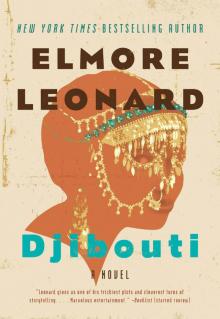 Djibouti
Djibouti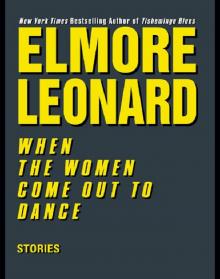 When the Women Come Out to Dance: Stories
When the Women Come Out to Dance: Stories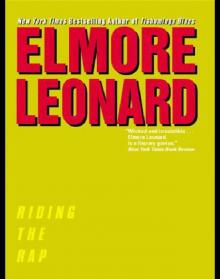 Riding the Rap
Riding the Rap Moment of Vengeance and Other Stories
Moment of Vengeance and Other Stories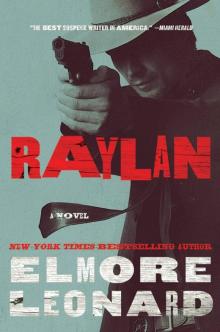 Raylan
Raylan Touch
Touch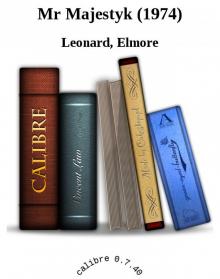 Mr Majestyk
Mr Majestyk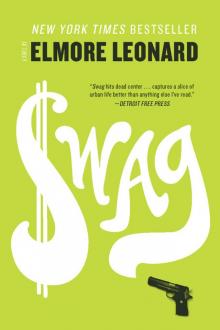 Swag
Swag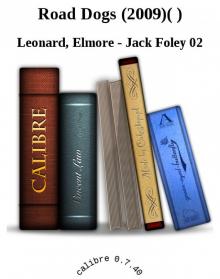 Road Dogs
Road Dogs La Brava
La Brava The Hot Kid
The Hot Kid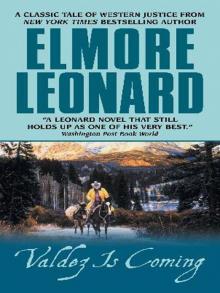 Valdez Is Coming: A Novel
Valdez Is Coming: A Novel Be Cool
Be Cool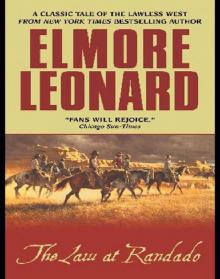 The Law at Randado
The Law at Randado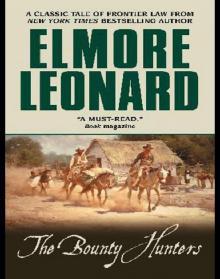 The Bounty Hunters
The Bounty Hunters When the Women Come Out to Dance
When the Women Come Out to Dance 310 to Yuma and Other Stories (1953)
310 to Yuma and Other Stories (1953)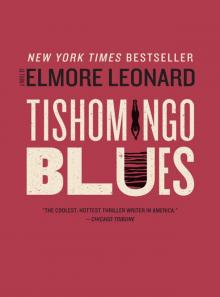 Tishomingo Blues
Tishomingo Blues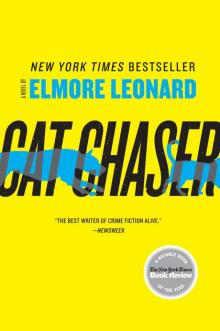 Cat Chaser
Cat Chaser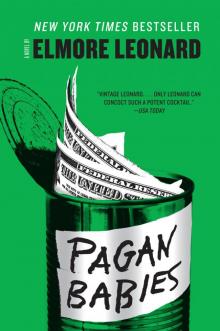 Pagan Babies
Pagan Babies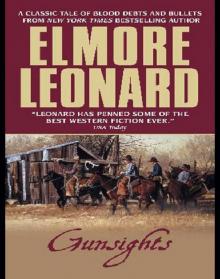 Elmore Leonard's Western Roundup #1
Elmore Leonard's Western Roundup #1 52 Pickup
52 Pickup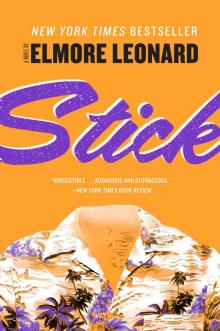 Stick
Stick The Moonshine War
The Moonshine War Valdez Is Coming
Valdez Is Coming City Primeval
City Primeval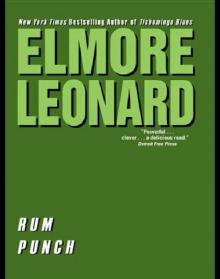 Rum Punch
Rum Punch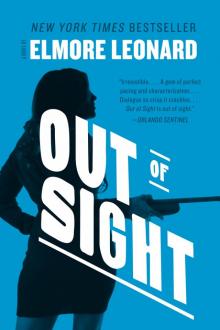 Out of Sight
Out of Sight Naked Came the Manatee (1996)
Naked Came the Manatee (1996)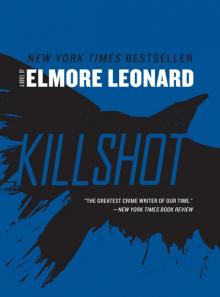 Killshot
Killshot Cuba Libre
Cuba Libre Forty Lashes Less One
Forty Lashes Less One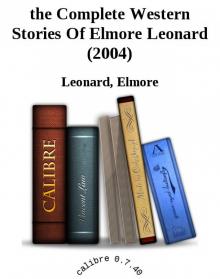 The Complete Western Stories of Elmore Leonard
The Complete Western Stories of Elmore Leonard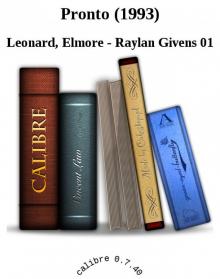 Pronto
Pronto Split Images
Split Images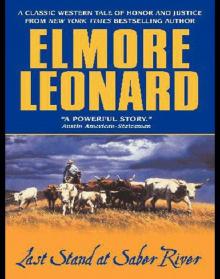 Last Stand at Saber River
Last Stand at Saber River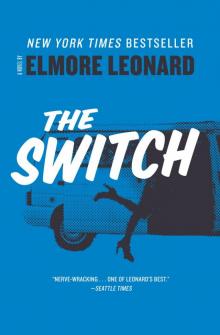 The Switch
The Switch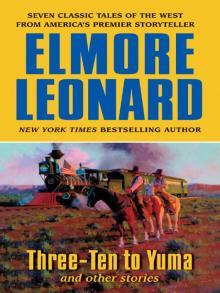 Three-Ten to Yuma and Other Stories
Three-Ten to Yuma and Other Stories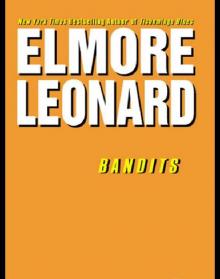 Bandits
Bandits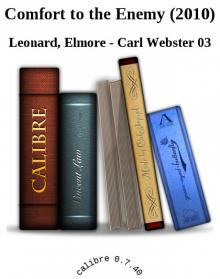 Comfort to the Enemy and Other Carl Webster Stories
Comfort to the Enemy and Other Carl Webster Stories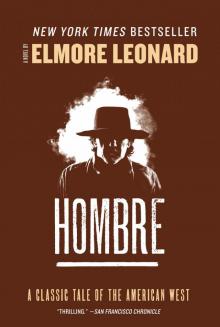 Hombre
Hombre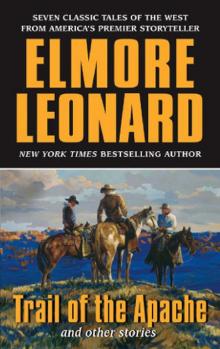 Trail of the Apache and Other Stories
Trail of the Apache and Other Stories LaBrava
LaBrava Gold Coast
Gold Coast Jackie Brown
Jackie Brown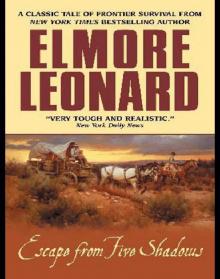 Escape From Five Shadows
Escape From Five Shadows Karen Makes out (1996)
Karen Makes out (1996)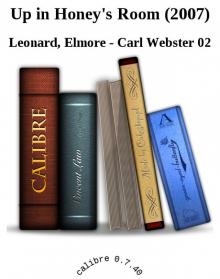 Up in Honey's Room
Up in Honey's Room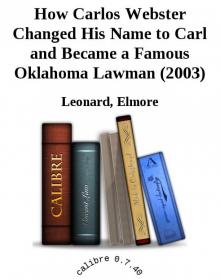 How Carlos Webster Changed His Name to Carl and Became a Famous Oklahoma Lawman (2003)
How Carlos Webster Changed His Name to Carl and Became a Famous Oklahoma Lawman (2003)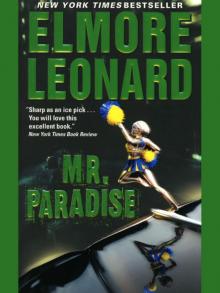 Mr. Paradise
Mr. Paradise The Hunted
The Hunted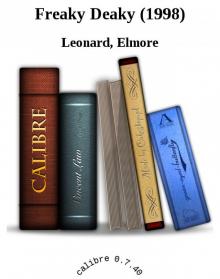 Freaky Deaky
Freaky Deaky Louly and Pretty Boy (Ss)
Louly and Pretty Boy (Ss)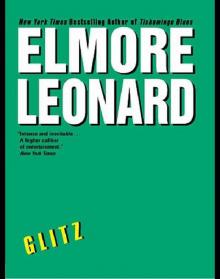 Glitz
Glitz A Coyote's in the House
A Coyote's in the House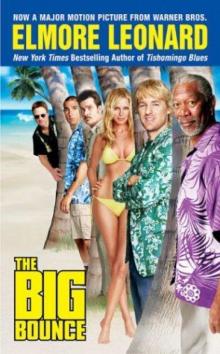 The Big Bounce jr-1
The Big Bounce jr-1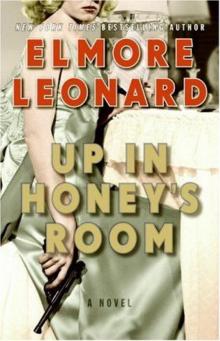 Up in Honey's Room cw-2
Up in Honey's Room cw-2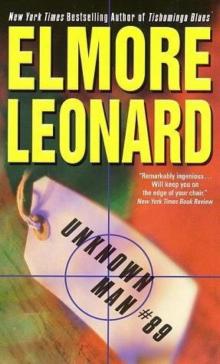 Unknown Man #89 jr-3
Unknown Man #89 jr-3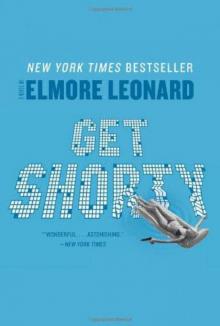 Get Shorty: A Novel cp-1
Get Shorty: A Novel cp-1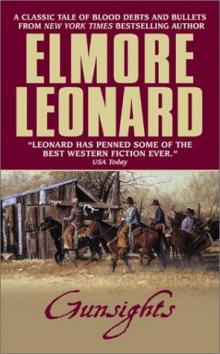 Gunsights
Gunsights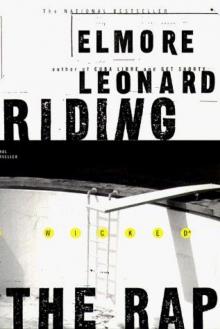 Riding the Rap rg-2
Riding the Rap rg-2